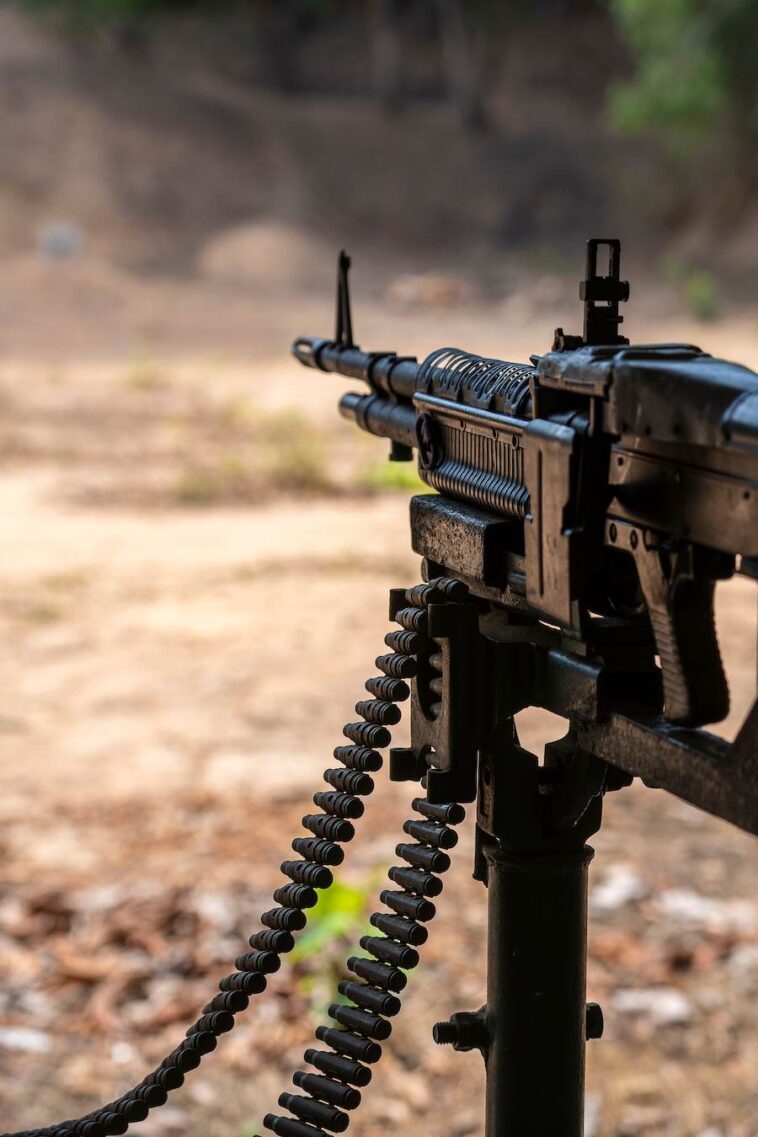
Machine Gun Laws: Federal Regulations and Colorado’s Specific Requirements
In recent years, the issue of federal machine gun possession allegations in Colorado has sparked a lively debate among legal experts and gun owners alike. The harmonious interplay between federal guidelines and state-specific rules creates a tangled maze that puts many in a nerve-racking predicament. In this opinion editorial, we’ll take a closer look at the challenges facing those accused of violating these laws and offer insights into how drawing on effective defense strategies can ease some of the overwhelming aspects of such cases.
Even seasoned gun owners are often caught off guard by the twists and turns of the laws that govern machine gun possession. Claims that they fully understand the legal landscape may be misplaced, as a close examination of the federal and Colorado-specific regulations reveals plenty of areas where the legal rules are not only intricate but also full of problems. By scrutinizing the details and piecing together evidence, defendants stand a chance at formulating defenses that tackle the nerve-racking parts of the case.
Understanding the Federal and Colorado Machine Gun Framework
The first step in finding your way through federal machine gun possession woes is to grasp the key components of the legal framework. The National Firearms Act (NFA) sets out the federal baseline, imposing formal registration and tax obligations on the manufacture, sale, and possession of machine guns. This act is the backbone of federal regulation, but individual states, including Colorado, add their own layers of restrictions that can complicate matters.
Colorado’s approach often involves additional stipulations and checks, making it essential for defendants to be aware of both the federal and state requirements. The state’s regulations may sometimes be even more strict than those at the national level, leading to a legal environment riddled with complications that many are unprepared to handle.
Table: Comparing Federal and Colorado Requirements
| Aspect | Federal Requirement | Colorado Requirement |
|---|---|---|
| Registration | Mandatory registration under the NFA | Additional state-specific registration processes |
| Background Checks | Extensive checks before transfer | May include further local law enforcement questions |
| Transfer and Tax Process | Tax payment and formal transfer documentation | Enhanced scrutiny and record-keeping |
| Storage Regulations | Secure storage is required | Stricter controls and potential state audits |
This table provides a snapshot of how the law at two different levels intertwines and sometimes conflicts, leaving defendants to untangle the fine points of each system.
Essential Role of Competent Legal Representation
Working through the legal maze against federal machine gun possession allegations is an intimidating task that no one should tackle alone. The difference between a favorable and an unfavorable outcome often hinges on the capability of legal counsel to address each little twist and turn of the case. If you are facing such allegations in Colorado, engaging an attorney with real-world experience in both federal and state firearms law is not just a recommendation—it is a must-have strategy.
Expert attorneys can point out the subtle differences between lawful conduct and potential misinterpretation of ownership rights. They are adept at sorting out the full stack of evidence and ensuring every document, statement, and piece of physical evidence is properly examined. Furthermore, knowing when to invoke legal tactics such as asserting a lack of knowledge about the nature of the firearm can bolster your case significantly.
Key Benefits of Experienced Legal Representation
- Evaluating evidence: Skilled lawyers help gather and appraise all available documentation, ensuring that any confusing bits are clarified.
- Courtroom strategy: They can challenge the legality of a search or seizure, potentially excluding unlawfully obtained evidence.
- Negotiations with prosecutors: With well-honed strategies, a lawyer can negotiate plea deals or alternative sentences that might otherwise not be considered.
- Expert witness coordination: Arranging for expert witnesses to explain the fine points of firearm technology and classifications is a huge plus.
Affirmative Defenses: Building a Robust Strategy
When facing federal machine gun charges, a successful defensive strategy often depends on your ability to use affirmative defenses. One common avenue is claiming that you had no knowledge of the firearm’s classification as a machine gun—a defense that, if supported by strong evidence, can significantly reduce liability.
Affirmative defenses may include, but are not limited to, the argument that the discovery of the evidence was the result of a search that failed to adhere to legal protocols. This means that if the police overstepped their authority or if the techniques used were questionable, you can argue for the exclusion of the evidence on the grounds of an illegal search and seizure.
Components of an Affirmative Defense Strategy
- Lack of knowledge: You may claim that you were unaware of the firearm’s status as a machine gun due to ambiguous labeling or confusing regulatory definitions.
- Challenging evidence: By questioning whether the evidence was legally acquired, you introduce doubts about its authenticity or relevance.
- Expert testimony: Bringing in ballistic experts or specialists in firearm technology can help clarify whether the weapon truly qualifies as a machine gun under the law.
- Procedural errors: Attorneys will often look for any missteps by law enforcement during the investigation—small procedural errors can sometimes make a big difference in the outcome.
Understanding ATF Regulations and Their Impact on Your Case
The Federal Bureau of Alcohol, Tobacco, Firearms and Explosives (ATF) plays a central role in enforcing federal firearm regulations, including those pertaining to machine guns. The ATF’s guidelines are key to understanding your rights and responsibilities, and a lack of clarity on these points can leave your defense working against challenging bits of the law.
Every step of owning, transferring, and storing a machine gun must align with ATF requirements. Non-compliance can lead to severe legal consequences, making it critical to get every detail right. It is crucial to figure a path through ATF regulations to bolster your defense and reduce the level of risk involved should an investigation arise.
Breakdown of ATF Requirements and Consequences
| Regulatory Aspect | ATF Requirement | Consequences of Non-Compliance |
|---|---|---|
| Registration & Taxation | Proper registration with mandatory tax payment in accordance with the NFA | May result in felony charges and significant fines |
| Transfer Protocols | Formal procedures and documentation for transferring ownership | Illegally completed transfers may lead to criminal liability |
| Storage Requirements | Secure storage practices that comply with federal mandates | Failure to secure a firearm can result in its seizure and further charges |
Understanding these requirements and the potential pitfalls of non-compliance is a must-have part of mounting an effective legal defense. Your attorney can help you review how well you’ve followed these protocols and whether any steps may have been overlooked in the past.
Strategies for Dealing with a Search and Seizure Under Question
One of the trickier parts of any firearm possession case is reviewing how evidence was obtained. The legality of the search and seizure process has a profound impact on the admissibility of evidence in court. If law enforcement fails to follow the correct protocols, it can provide the basis for a strong defense under the exclusionary rule.
Challenging a search and seizure involves proving that the methods used by the police were off-putting, violating internal procedures and constitutional rights. Defendants are encouraged to document every interaction with law enforcement meticulously. This documentation includes dates, times, and the circumstances surrounding these events—essentially, every bit of data that can later be used to highlight inconsistencies.
Steps to Challenge Illegal Searches and Seizures
- Document all interactions: Keep detailed records of any contact with authorities.
- Review search warrants: Analyze the validity and scope of the search warrants used.
- Consult a legal expert: An attorney can evaluate whether any aspect of the search violated your rights.
- Collect witness testimony: Statements from impartial witnesses can support claims of irregular or intimidating conduct by law enforcement.
Securing and Presenting Evidence: A Cornerstone Defense
A solid defense against federal machine gun possession allegations hinges on rigorous evidence collection and examination. The objective is to find inconsistencies, prove compliance with all applicable laws, and pinpoint any overlooked details that might support your claim of innocence. Evidence can range from ownership documents and purchase records to communications with dealers or even past correspondence with local authorities.
As part of your defense strategy, it is critical to examine and organize all available documentation. Sorting through each document might reveal slight differences or minor errors in the prosecution’s narrative. In addition, ensuring that every piece of evidence is clearly dated and corroborated by external sources builds a strong foundation for your argument in court.
Key Evidence Collection Techniques
- Digital Records: Emails, transaction receipts, and online communications can provide a written account of ownership and compliance.
- Official Documentation: Registration forms, background check records, and tax payment confirmations all serve as proof of adherence to legal protocols.
- Expert Evaluations: Consider hiring a firearms expert who can explain the fine shades that differentiate a machine gun from other types of firearms.
- Witness Statements: Affidavits from individuals who can support your interpretation of events are important, especially if law enforcement procedures were less than straightforward.
Dealing with Law Enforcement: Know Your Rights
When contacted by law enforcement, it’s crucial to maintain a calm demeanor and be fully aware of your rights. In situations where the encounter feels overwhelming, it’s often best to refrain from answering questions until you have the opportunity to consult with an attorney. This approach ensures that you do not inadvertently undermine your defense by sharing information that might be used against you later.
If you find yourself unexpectedly in a situation where law enforcement is investigating a machine gun possession allegation, the following steps are strongly recommended:
Immediate Steps to Take When Contacted by Law Enforcement
- Stay calm: Keeping your cool helps prevent the situation from escalating into something more problematic.
- Exercise your right to remain silent: Politely state that you wish to speak with an attorney before answering any questions.
- Document the interaction: If possible, note the time, place, and names or badge numbers of the officers involved.
- Seek legal counsel immediately: Engage an attorney who understands both the federal standards and the state-specific regulations in Colorado.
Exploring Legal Alternatives: What Are Your Options?
In addition to formulating a defense against allegations of machine gun possession, many individuals in Colorado also explore legal alternatives that avoid the nerve-racking complications of owning a restricted firearm. There exist several options in Colorado for those who want to enjoy their rights while staying compliant with both state and federal laws.
For example, many opt for legal alternatives such as shotguns, rifles, and handguns that are not subject to the stringent regulations governing machine guns. These alternatives provide a legal path that can offer both recreational and practical benefits without exposing owners to the risks associated with misinterpreting machine gun classifications.
Safe and Legal Alternatives to Machine Guns
- Handguns: Widely available and subject only to baseline federal and state controls.
- Rifles and Shotguns: These non-automatic firearms provide options with fewer hoops to jump through regarding registration and tax issues.
- Semi-Automatic Firearms: While still subject to regulation, these weapons often have a simpler legal profile compared to fully automatic machine guns.
- Lever-Action Firearms: These offer a historical appeal while staying clear of the more complicated registers associated with modern automatic weapons.
The Broader Implications: Defending Gun Rights in a Tense Climate
At its core, the debate over machine gun possession allegations in Colorado is part of a larger conversation about gun rights in America. While the laws are designed to protect societal safety, the delicate balancing act between individual rights and public security leaves many legal provisions loaded with issues. This litigation area is contentious, and the responsible exercise of gun rights requires stakeholders to continually examine and, when necessary, challenge both old rules and new interpretations.
In this context, defending against federal machine gun possession allegations is more than just defending a singular right—it is about asserting the principle that lawful gun ownership should not be undermined by overly cautious or misapplied legal standards. Every case that challenges the interpretation of the law paves the way for a broader dialogue surrounding the delicate balance between safety and individual freedom.
Key Considerations for Protecting Your Rights
- Understanding the law: Stay informed about both federal and state requirements—knowledge is critical in a tense legal culture.
- Advocating for reform: Engage in community discussions and political dialogue to help sculpt fairer regulations.
- Supporting responsible ownership: Recognize that adherence to protocols is both a right and a responsibility.
- Legal preparedness: Always have access to reliable legal counsel in case you need to figure a path through complex interactions with law enforcement.
Final Thoughts: Constructing a Sound Defense Against Allegations
The process of crafting a solid defense in the face of federal machine gun possession allegations in Colorado is both a challenging and crucial endeavor. With consequences that can stretch to include lengthy prison sentences, hefty fines, and a permanent mark on one’s record, each step of the legal defense must be meticulously planned.
From understanding the tangled issues of federal and state law to effectively challenging the legality of search procedures, every element of your defense matters. Gathering coherent evidence and using expert witness testimony are key components in constructing an unassailable argument that emphasizes your commitment to following the law. Moreover, staying well-informed about ATF guidelines not only helps in mitigating any potential charges but also reduces the risk of future legal entanglements.
In summary, the landscape of machine gun possession regulations is full of confusing bits, tricky parts, and overwhelming rules that require an organized, well-defined approach to overcome. Whether it’s sorting out your legal paperwork, engaging with experienced counsel, or carefully documenting your encounters with law enforcement, each action you take is a step towards clarifying your rights and cementing a robust legal defense.
Summary of Recommended Actions
- Educate Yourself: Familiarize yourself with both federal and Colorado-specific machine gun laws.
- Consult Expert Counsel: Secure a lawyer with experience in handling these nerve-racking cases.
- Organize Documentation: Keep detailed records of all transactions, communications, and legal documents.
- Challenge Irregularities: Be prepared to contest unlawful searches, seizures, or procedural errors that may arise.
- Consider Legal Alternatives: Explore other firearm options that pose fewer legal complications.
Conclusion: Safeguarding Your Future Amid Legal Challenges
There is no one-size-fits-all solution when it comes to defending against federal machine gun possession allegations in Colorado. However, by understanding the full scope of both federal and state requirements, recognizing the key role of skilled legal representation, and thoroughly examining every piece of evidence, you can mount a defense that stands up under the microscope of legal scrutiny.
In our increasingly tense legal environment, achieving a balance between responsible gun ownership and adhering to strict regulatory guidelines is more important than ever before. As the conversation on gun rights continues to evolve, both defendants and policymakers must remain committed to fairness and justice. Equipping yourself with the right tools, insights, and professional guidance can make all the difference between facing daunting allegations and driving towards a just resolution.
Ultimately, while the road through these tangled legal issues may be intimidating and filled with confusing bits, an informed, systematic, and proactive approach can carry you through. Let this editorial serve not only as a guide to understanding the key defense strategies but also as a call to engage critically with laws that touch on one of the most debated rights in our society. The law, in all its twists and turns, is best approached with both caution and confidence.
Originally Post From https://www.mastersonhall.com/strategies-against-federal-machine-gun-possession-allegations-colorado/
Read more about this topic at
Firearms and Defensive Tactics Training and Consulting Agency
Strategic Precision Defense | AR15 Uppers & Lowers, Mil …


